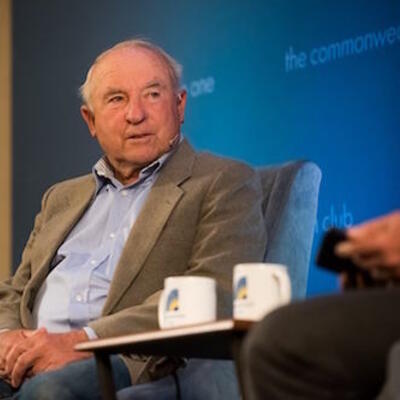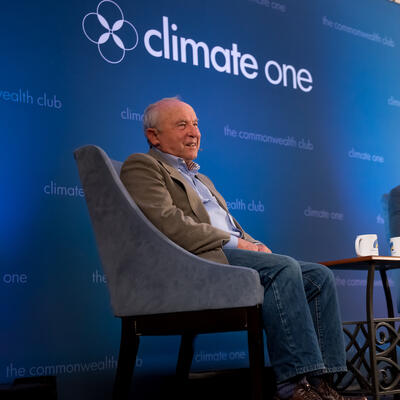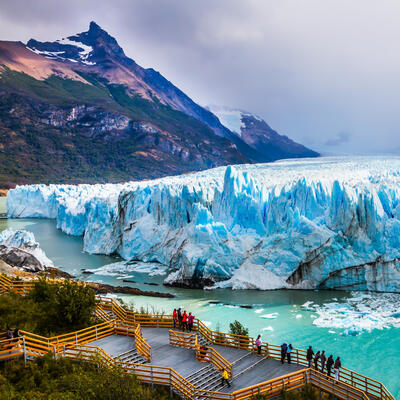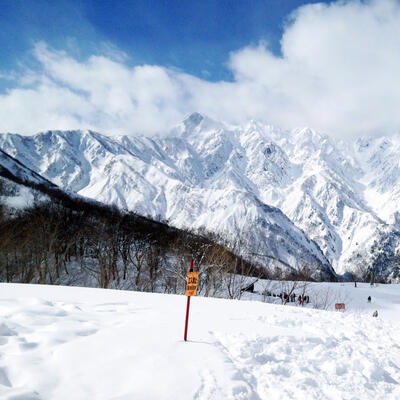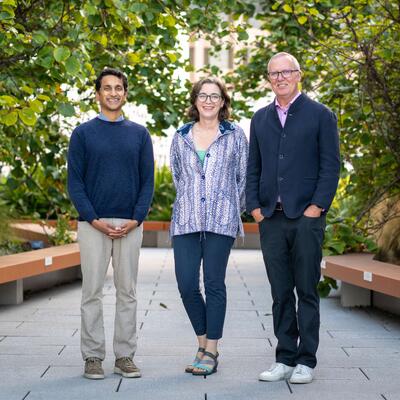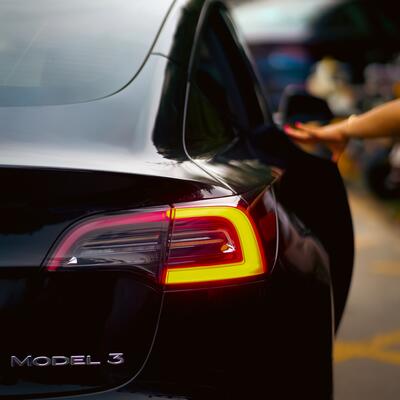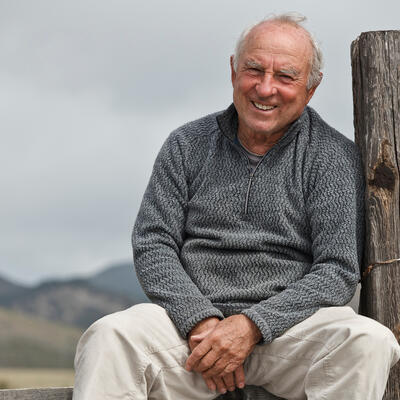
Yvon Chouinard: Giving It All Away
Guests
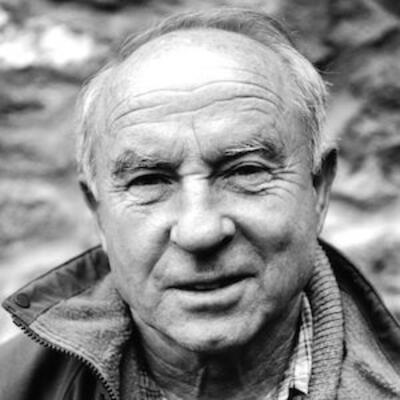
Yvon Chouinard
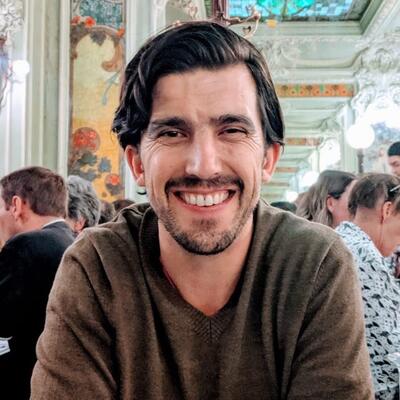
Michael Kavate
Summary
The clothing company Patagonia has become synonymous with outdoor adventure and sustainability, largely because of the unconventional approach of its founder Yvon Chouinard.
The pioneering founder and owner of Patagonia is known for charting his own path through the wilderness and through business, rather than pushing customers to buy new jackets and gear. Yvon Chouinard’s company helps people fix buttons and zippers, and collects worn out clothes for resale and recycling. In an industry not known for its social and environmental responsibility, the company is a leader in understanding the impacts of its operations on people and the planet, and works hard to do no unnecessary harm.
“I really believe that all of us should be buying less, but buying better,” he told climate One host Greg Dalton during a 2016 interview about his memoir, Let My People Go Surfing: The Education of a Reluctant Businessman.
All that effort drives up costs. But until recently, the only shareholders were Yvon Chouinard, his wife Melinda, and their two adult children. Over the years, the reluctant billionaire has also prioritized philanthropy to grassroots environmental groups. Now, they’ve given the very profitable company away entirely to a specially designed trust and a nonprofit organization that will dedicate Patagonia’s profits to addressing climate change and preserving land.
“I'm gonna do what I can, with the resources that I have, which is my company and some private philanthropy. And I'm gonna sleep at night knowing that I'm part of the solution rather than part of the problem,” Chouinard says.
$100 million is significant, but climate still only accounts for 2% of global philanthropy, says Michael Kavate of Inside Philanthropy. That means much more is needed to really drive change.
“This is 100 different pushes in 100 different directions trying to reduce emissions and thus philanthropy in all kinds of spheres can be impactful when targeted at areas that haven't seen attention before,” Kavate says.
By giving away their fortune in their lifetime, and funding grassroots environmental groups, Chouinard and his family stand apart from most traditional philanthropy which supports large, established organizations and often furthers the power of the donor, says Kavate.
“[Billionaires have] succeeded wildly under this current system. They think it needs to be tweaked so that we don't overheat ourselves rather than recreated wholesale.”
He’s hopeful that the next billionaire philanthropist considers appointing a group of people most impacted by climate change and having them make decisions about how to spend the money.
“I hope that people go beyond what Patagonia has done. It's remarkable they have, in one stroke, ended their status as billionaires. But I think to both give away your wealth and to give away your power would be truly transformative.”
Related Links:
Billionaire No More: Patagonia Founder Gives Away the Company
Patagonia Could Yield $100 Million a Year in Green Giving. Where Will the Money Go?
Full Transcript
Note: Transcripts are generated using a combination of automated software and human transcribers, and may contain errors. Please check the actual audio before quoting it.
Ariana Brocious: This is Climate One. I’m Ariana Brocious, in for Greg Dalton.
The pioneering founder and owner of Patagonia is known for charting his own path through the wilderness and through business. Rather than pushing customers to buy new jackets and gear, Yvon Chouinard’s company helps people fix buttons and zippers, and collects worn out clothes for resale and recycling. In an industry not known for its social and environmental responsibility, the company is a leader in understanding the impacts of its operations on people and the planet, and works hard to do no unnecessary harm.
All that effort drives up costs. But until recently, the only shareholders were Yvon Chouinard, his wife Melinda, and their two adult children. Now, they’ve given the very profitable company - valued at $3 billion - away entirely to a specially designed trust and organization that will dedicate its profits to addressing climate change and preserving land. In light of that news, we’re revisiting our 2016 interview with Yvon Chouinard in front of a live audience at the Commonwealth Club of California. We’ll talk more about the current state of climate philanthropy later in the show. For now, we’ll hand the mic to Climate One host Greg Dalton.
Greg Dalton: Let's begin on an important evening in your life. 1956. It's your high school prom. And what are you doing?
Yvon Chouinard: I'm down at the LA River bottom down there, gigging frogs and catching crawdads.
Greg Dalton: So rather, when everyone else is at the dance, you're in the river chasing frogs.
Yvon Chouinard: Yeah. I was never a dancer, actually.
Greg Dalton: Well, in 1968 you took a trip that you say shaped your life. You drove to a 10,000 mile trip down the Pan American Highway, it was dirt then. So tell us about that trip and how it shaped your life.
Yvon Chouinard: Well, you know, I've been on a lot of different expeditions and trips. The longer they are, the more you get something out of them. And this was a six month trip and so we left Ventura, California with an old van. This was Doug Tompkins and myself and, and some other folks. And we loaded the van up with surfboards and skis and climbing equipment. Bought an old Bolex 16 millimeter camera and took off surfing all the way down to Lima. Went to Chile and climbed volcanoes and skied down 'em. That's where I learned to ski. Crossed over the Andes and went over and climbed Fitzroy, a real famous mountain that had been only climbed twice, and we did a new route on it and we made a film on the whole thing, and, and that's when I fell in love with that country, the southern end of South America called Patagonia. And it affected Doug Tompkins a lot and myself and that's why I named my clothing company, Patagonia, because I wanted to make clothing for those kind of conditions, you know, like Cape Horn and wild mountains and wild weather.
Greg Dalton: And so you founded an outdoor gear company, you got into clothing, and at some point you realized that you were running a business, but you didn't wanna be a businessman.
Yvon Chouinard: Well, I never wanted to be a businessman. I was a craftsman and I was a climber. And I just, every time I'd go into the mountains, I'd have ideas on how to make the gear better. The gear was pretty crude in those days. It was all made in Europe. So I just got myself a forge and an anvil and a book on blacksmithing, and I taught myself how to blacksmith. And that led to making these pitons and eventually ice axes. And crampons and all the gear for mountain climbing and never did it thinking that it was a business. It was at first it was just making the stuff for myself and friends and then friends of friends. And pretty soon I'm making two of these pitons an hour and selling 'em for a dollar and a half each. Well, not too, not too profitable, right? I kind of backdoored becoming a businessman, cause this is, this is in the sixties and, you know, business men were all greaseballs in the sixties. You know, this is a counterculture that we were in and we didn't respect business. In fact, they were the enemy. And so one day, later on, I kind of woke up and discovered, oh my God, I am a businessman. And that's when I decided I better find out what I'm doing and started reading a lot of books on business and basically trying to create a business that we wanted to come to work in. All of us. I mean, it wasn't just me, but all of us were all dirtbags. So that's what we did.
Greg Dalton: And explain that term “dirtbags” has a particular meaning for people who–
Yvon Chouinard: Well actually that term dirtbag, now you hear it all the time, but it actually came from Yosemite.
Greg Dalton: People who are out in nature a lot. In 1981, you had a near death experience in an avalanche in China. One person died. Others you survived. Tell us about that.
Yvon Chouinard: Yeah. I used to go on a lot of, I'm kind of a serial climber, you know, I'd spent two years just climbing cracks. I'd spent five years just climbing big walls, like in Yosemite. I'd spent years and years learning ice climbing, in fact, writing a book about it. And then I did a bunch of expedition climbing on the Himalayas. Antarctica and places like that. And one trip to Tibet, there were four of us coming down from camp two on this 25,000 foot peak. And we set off an avalanche and we were roped up together and we went over a 30 foot cliff. We went about 1500 feet. Went over a 30 foot cliff and the avalanche stopped and we're trying to untangle ourselves from all the ropes and stuff, and we're thinking, Oh my God, we're alive. But the avalanche started again and at that point we knew that at just a few hundred feet below, there was a 300 foot cliff. So, we knew we were dead. And we accepted the idea that we're dead, we're gonna die. And the avalanche stopped 30 foot from the cliff and one of the guys had a broken neck and he was dead. Another friend had a broken back. I had broken ribs and a concussion. I had no idea where I was. And it kind of changed my life. I've had a lot of close calls, near death experiences, but always afterwards you go around sniffing the flowers and being really happy to be alive and everything. And, but after that, all of us were deeply depressed for several months afterwards and it's, I've read stories about people that have kind of died and come back and you resist coming back. And in fact, it's taught me that there's nothing to fear about death itself. It's a pretty pleasant feeling. And since then, I've, first of all, I really scared the heck outta my family and I realized I don't want to do that again. I really cut back on that kind of climbing. But also have an attitude that, you know, when my time comes, I'm gonna go out pretty peacefully.
Greg Dalton: You said, An adventure isn't an adventure until something goes wrong. Do you still believe that to be true?
Yvon Chouinard: Yeah. I mean, every definition of adventure in the Websters has risk. Whether it's a financial venture or whatever, and adventure travel, that's a oxymoron. They make sure that you're not gonna get into any trouble.
Greg Dalton: Sign those release forms. Yeah.
Yvon Chouinard: So, yeah, and you know, if you really search out adventure, you have to purposely leave out some gear or, or you have to purposely stick your neck out. Otherwise you're not gonna have an adventure. If you figure it out to an nth degree, it's not gonna happen. And, and we searched out adventure when I was, when I was a kid. We always dared it to happen so we could fight our way out of it. And you know, that's when you get the most value out of the experience.
Greg Dalton: Do you feel that about your own children having adventure too?
Yvon Chouinard: Of course not. I want 'em to be as safe as possible. I don't want to hear about it. (laughter)
Greg Dalton: Fair enough.
Yvon Chouinard: And in fact, the first time my parents knew I was a climber, they were, this is 1964, they were watching television and on the news program, there's a helicopter coming by the, the North American wall of El Capitan. And then it zooms in on these guys hanging from hammocks underneath this big overhang 2000 feet up. And one of 'em is their son. They always thought when I said I was going climbing that I was going hiking.
Greg Dalton: So what was it like when you got home when they found out about that?
Yvon Chouinard: They were aghast, that's for sure.
Greg Dalton: Ten years after that avalanche in China, your company had a near death experience. Why did that happen and how did you turn it around?
Yvon Chouinard: Well, we were growing our business in the normal ways. We were adding more wholesale accounts, we were building more retail stores, and the market wanted our products. And so we were growing 50% a year. And you know, you can't grow a business with 50% growth year after year on retained earnings. At some point you're gonna crash. And at the same time there was a recession. And the banks wouldn't lend us any money. We had bought inventory for another 50% growth, and as it turned out, we only had a 30% growth. Well, that's a huge difference. And we got into really deep financial trouble. I mean, so deep that I could hardly get out of it. My accountants introduced me to the mafia. Who ironically won a 28% interest, which is what you pay on your credit cards now. Yeah. That's mafia. And I finally got by borrowing money from friends and friends of friends and stuff like that, but, but it also was a wake up call that I was doing business, just like everybody. I was growing for the sake of growing and not thinking about what I was doing. And that forced us to sit down all of us in the company and ask ourselves, why are we in business?
And in fact, we went, I took all the most important people in the company. We went down to Patagonia and we walked around in the wilderness and we sat down for three, four hours a day and talked. Okay. Why are we in business? What are we trying to do? What are our values? And that's what eventually became this book, Let My People Go Surfing, And it changed the whole way we did business. And what we did is create a business that we wanted to come to work in. And it's pretty different from a lot of other companies. I can tell you that. And it works.
Greg Dalton: Lots of companies talk about their values, they have them posted by the water cooler, et cetera, but it's a different thing to live them. So how do you operationalize them and do you keep coming back to them? Cause all CEOs and companies say they have values.
Yvon Chouinard: Well, for instance, our management. I mean the name of my book is Let My People Go Surfing cuz we have a policy. If your child is sick, go home, take care of 'em, uh, no matter what. I don't care when you work, as long as the job gets done and if the surf comes up, drop everything, go surfing. None of us liked authority. We really disliked authority and none of us wanted to tell other people what to do. So our management system is kind of like an ant colony. You know, an ant colony doesn't have any bosses. The queen just lays there and lays eggs. There's no boss in an ant colony but every single ant knows what his job is and gets it done. And they communicate by touching feelers, and that's about it. And so in Native American societies, the chief was not the richest guy in the tribe. He was the best orator because the tribe made decisions on consensus. Now that's the opposite of how our government works. Our government works on compromise, which never solves the problem. It cuts the baby in half, so to speak. And to build consensus, you have to have leaders that can convince everybody that we're gonna go in this direction. And it's kind of like a SEAL team. If one guy in the SEAL team says, Oh, I don't know about this thing we're going on, I think I'm gonna just hold back a little bit, it doesn't work. Every single person in that SEAL team has to agree this is what he's gonna do. And if the leader gets killed, the next guy takes over, he gets killed, the next guy takes over. It's leaderless really. And that's our management style. And so I hire very independent, very self-motivated people who believe in what we're trying to do, and I leave 'em alone. And in fact, I had a psychologist came one time and studied our company and said, Gee, I gotta tell you, um, we did psychological profiles and a lot of people, you know, to see if, make sure the right brain people were working on right brain jobs and stuff like that. Said, I gotta tell you that your people are the most independent people I've ever seen in a company. In fact, they're really unemployable anywhere else.
Greg Dalton: It's a good thing you gave them jobs.
Ariana Brocious: This is Climate One. I’m Ariana Brocious. We’re listening back to our 2016 conversation with Yvon Chouinard in front of a live audience at the Commonwealth Club. Climate One host Greg Dalton asked Chouinard which was a greater accomplishment: climbing El Capitan, a 3000-foot, sheer rock face in Yosemite, or founding three global companies.
Yvon Chouinard: It's only dawned on me recently, the effect that my companies have had in society. I never really thought much about it, but, you know, we're a relatively small company, but we have an incredible amount of social power around the world. It's only dawned on me recently that we have this and therefore we probably have the responsibility to use that power and not just hire other people to do the right thing and stuff. So it's changed the way our company operates. Instead of just giving money away to a bunch of NGOs, which we still do. We're doing a lot more stuff ourselves. So I guess yeah, I'm pretty stoked about the climbs I did on El Cap, they were really important for me at that time. It built the character that I am now probably, but I'm starting to be pretty proud of the company, too.
Greg Dalton: Lot of moral authority, deep following that Patagonia has. And there was one time where you were approached by Walmart, which is a huge corporation villainized by a lot of probably Patagonia followers. So tell us about dancing with the Devil.
Yvon Chouinard: Well, a few years back, the Walton family told the CEO that they wanted to green Walmart. Basically make it more environmentally responsible. Well, the CEO had no idea what that meant. So he sent a team of, I think seven or nine people to Ventura to talk to us about what it means. And also they realized that they couldn't do what they wanted to do without getting other large companies all together doing the same thing so that there was a level playing field. And so they sent a letter out to, oh, I don't know, a lot of the largest companies in America to come to New York to talk about greening their companies and a new way of doing business and stuff. And nobody came. So they got a hold of us and said, will you co-sign a letter? Walmart and Patagonia, inviting these people to New York? And everybody came. So we started an a sustainable apparel coalition, which is kind of bogged down in bureaucracy, but the ultimate goal is to basically give information to consumers so that they know what they're buying so that a young person buying a pair of jeans can look at five pairs of jeans on a table and, and zap the barcode and it'll tell 'em how each jean is made and, and it'll have a grade as to which one is made more responsibly. That's the ultimate goal.
Greg Dalton: Do you think that sustainable purchasing, green living, is that legitimate? Can corporations be a force for the sustainability changes that you want to see? Or is that just greenwashing?
Yvon Chouinard: Well, it has to be forced by the consumer. I don't think corporations are gonna change on their own, public corporations. I mean, Robert Wright wrote a book on capitalism and he devotes two chapters to why public corporations can never be responsible. But you know, all of us here are no longer citizens. We're consumers. That's our brand now. And I used to think that maybe designers had the most power cause they decide what color car you're gonna drive, you know, what clothes you're gonna wear and stuff. But you can just say no, that's pretty powerful. And so we have the power and corporations will only change when we force 'em to, and at the same thing with government, I'll tell you a little story about mountain guiding. There's two types of mountain guiding. One is democratic where you, you're, you're guiding somebody up the Grand Teton, which is a pretty safe mountain. And the client starts freaking out. So you pull out your harmonica and you play your harmonica a little bit. You calm 'em down and and you kind of, you know, take your time and, and you get up it, a very effective way to guide on a non-difficult mountain. Let's say you're guiding on the Matterhorn and you know, you're 60 years old, a guide and you got a family. And you know, remember the client is always out to kill you. A mountain like that, it's rotten rock. It's thunderstorms every afternoon. And the client freaks out. The guide screams at him, pounds on 'em, calls them names, tugs the rope and gets 'em to the top. So what happens is the client is more afraid of the guide than the mountain. And that's basically how we have to treat our government.
Greg Dalton: True or false, you could claim residency in Wyoming. Which has no state income tax. Instead, you choose to pay taxes In California, a high tax state.
Yvon Chouinard: Now I believe in taxes. I'm happy to pay my taxes. And when I see corporations like General Electric who paid no income taxes a few years ago, I think it's pretty sad. It's in fact. I believe in taxes so much that we tax ourselves our 1% for the planet taxes, we tax ourselves. And the best part is we decide where it goes.
Greg Dalton: You recently converted Patagonia into a B corporation, which is a new type of corporate structure that allows companies to seek social and financial returns without worrying about getting sued by investors for not maximizing profit at the expense of all else. So the question is, you did that to ensure that your two children who will inherit the company or other future owners won't change the company's values?
Yvon Chouinard: Yeah. Actually they don't inherit the company, but it goes into a trust and the law, the way it is, forces every company to become public. And if the trust, if, if myself and my kids and die, the trust has eight years to divest 80% of the stock, cause the law doesn't want you to own more than 20% of stock in any one company, a foundation law, and it also forces you to sell to the highest bidder. You can't just sell your company to a close friend for $2. So the highest bidder for us, of course, would be going public. Well being a B corp., you don't have to do that. You can establish what your values are and you put that in your corporate charter and you can avoid that. So hopefully the company can keep going with the same values for a long, long time.
Ariana Brocious: We’re listening back to our interview with Patagonia founder and owner Yvon Chouinard from 2016. Earlier this year, Chouinard made headlines by choosing to divest of his company entirely, transferring ownership to a new nonprofit organization that will dedicate its roughly $100 million of annual profits to addressing climate change and preserving undeveloped land.
Michal Kavate is a staff writer at Inside Philanthropy who covers climate giving. I asked him how big a deal this is in terms of climate philanthropy.
Michael Kavate: It's important that we keep seeing gifts of this size. Climate philanthropy has seen a large influx and this is both large by certain comparisons. And you know it's dwarfed by things like Jeff Bezos spending a billion a year and other major gifts like that. But it's up there. And one very important thing is that the history of Patagonia is that it's supported very small groups, which have traditionally struggled to get funding from some of these larger big donors and that could really help them rise along with some of the biggest groups in the world whereas right now there's a fear that an influx of funding is going to make biggest bigger and leave the small behind and kind of reinforce a disparity that's existed from the beginning of climate philanthropy.
Ariana Brocious: So, essentially the money that comes into the space now. A lot of it goes into what are called big greens or big groups as opposed to grassroots ones that are more focused on direct action. And Patagonia is an outlier in a way they've been funding people.
Michael Kavate: Yeah. Historically they have funded a lot of small groups often focused on direct action very grassroots organizations. And historically you know you talk to anyone in the climate movement and most will acknowledge that everybody has a role to play. an all hands-on deck time for climate and the environment. And yet the money has overwhelmingly flowed to some of the largest organizations. There's been exceptions, Bezos for instance has put a large chunk of his US dollars towards climate justice groups, which is great. But to have a Patagonia where virtually all the money goes to such groups is a good counterpoint to many funders who are sending virtually all their money to some of the largest and most well resources such as John Doerr the venture capitalist’s gift of 1 billion to Stanford. Both something we need in terms of science and technology development, but also making a very rich institution that much richer.
Ariana Brocious: Right. So, in terms of the monetary figure here. How far does a $100 million really go in the climate space and how impactful can that money be?
Michael Kavate: You know there's roughly was $1.9 billion in climate. So, 100 million is both a lot and we need a whole lot more of the sector still only accounts for 2% of global philanthropy. I think it's dangerous to think any you know a large sum is nothing. It's also important to recognize that no single gift no matter how big it is is the tipping point. important It depends how it’s deployed but it's also just important for this example to spur more people to give because we’re still a long way away from philanthropy spending enough to really make a difference in this area.
Ariana Brocious: Why don't more billionaire philanthropists prioritize climate?
Michael Kavate: Climate philanthropy as a whole is relatively new. I think just as we've seen the world fail to spend or react to the threat of climate change, philanthropy's been the same. There’ve been some notable foundations that have come in. There's been some families who have started early, but on the whole climate philanthropy is playing catch-up just as the world and our governments are. it has also probably struggled from the lack of a personal connection. Ultimately, you look a lot of billionaires giving and it goes to their universities. It goes to big medical institutions where maybe they had treatment. There's also a roll of getting your name on a building getting your name on a wing. And you don't see that same factor necessarily in climate.
Ariana Brocious: We recently had on the show Anand Giridharadas and he was saying and reflecting on this change that Yvon Chouinard made in his legacy that by investing both in these grassroots groups and then also in maybe some political action that he in a departure from sort of standard philanthropy which can help in a way as you just said aggrandized someone's own image and kind of even bolster their own power through giving. That this could then chip away at that power because it's possibly funding policy changes, right, if it's public political spending or something. I'm curious what you think about that idea.
Michael Kavate: Yeah, traditionally philanthropy by the wealthy has gone to kind of big picture solutions that work within the existing framework whether it's the drive electric campaign of ClimateWorks and many billions of dollars going into that many from major donors. Things that want to take the world as we know it today and say pull out combustion engines and put in electric engines, right. And so, there is an element that climate justice, the racial justice groups working on climate, those organizations are pushing for a deeper wider change. And you are unlikely to get many billionaires who are eager; they've succeeded wildly under this current system they think it needs to be tweaked so that we don't overheat ourselves rather than you know recreate it wholesale. And thus they’re not gonna fund the groups that see this as a chance to remake our world in a way that you know a certain amount of science and studies suggests is absolutely necessary to fully address climate change.
Ariana Brocious: What do you think would make a big donor shift their focus to climate? We've seen a couple of these gifts happen. Are there trends or motivators that you're seeing in common among some of these big donors?
Michael Kavate: With a lot of the big donors lately it seems that their children are really pushing them. Steve and Connie Ballmer of Microsoft recently started the climate program with their son in the lead. I think the Walton’s younger generation has also helped to redirect their environmental program more and more towards climate. So, we’re seeing the youngest generation of these billionaire families say hey, we can’t ignore this you know this is our future. This is what we need to do in order to you know have a life that’s worth living, you know, not just for us but the rest of the world.
Ariana Brocious: What trends do you see in the climate philanthropy space in general?
Michael Kavate: Ultimately, there's a lot of funders entering you know whether it's the Ballmers or Mark Zuckerberg. Many billionaires are starting to spend on climate and maybe there's some degree of a copycat effect. These people all run in similar circles. At this point I think if you’re a philanthropist and you’re spending a lot of money you're getting pushed by your peers. And groups like Climate Leadership Initiative, which is behind a lot of these new programs are pushing them to start to spend. So, one of the biggest trends is just an influx of a whole lot more money. And at the same time, there's whole areas that have not been funded at all commensurate with their need. For instance, I’ll say a mere multimillionaire gave some 25 million to decarbonizing concrete. Industry as a whole accounts for 24% of greenhouse gas emissions according to the IPCC. Concrete accounts for some smaller portion of that. But industry itself has gotten so little from climate philanthropy that this recent donation of 20 million basically, was the largest single donation to reducing emissions from industry in the history of climate giving. And so, that demonstrates how a number that might not make headlines for us like a Patagonia gift is still hugely impactful. And it illustrates how this is not a silver bullet issue. This is 100 different pushes in 100 different directions trying to reduce emissions and thus philanthropy in all kinds of spheres can be impactful when targeted at areas that haven't seen attention before.
Ariana Brocious: What kind of climate philanthropy do you personally think is most important?
Michael Kavate: What I would like to see from the next Yvon Chouinard is taking their fortune and instead of choosing where to put it, finding a mechanism to appoint a group of people who are most impacted by climate change and have them make the decisions. That's the ultimate form of philanthropy, I believe. Because if you're still making the calls, if you still have the power, that is how philanthropies worked for hundreds of years. But to give over that power as some institutions are doing in often in small ways is the next wave of philanthropy.
Ariana Brocious: Michael Kavate is a staff writer with Inside Philanthropy. Michael, thank you for joining us on Climate One.
Michael Kavate: It’s been my pleasure.
Ariana Brocious: This is Climate One. I’m Ariana Brocious. We’re revisiting Greg Dalton’s 2016 conversation with Yvon Chouinard, founder and owner of Patagonia. The clothing company is known for sustainability, but Chouinard says it’s been an evolution. Part of it started when they opened a retail store in Boston.
Yvon Chouinard: We got an old building and we retrofitted it, opened it up, brought in all the clothing, and within three days, my employees were complaining they were getting headaches. And so I brought in a chemical engineer and he said, the problem is your ventilation system is recycling the same air and you're poisoning your employees. I said, Well, wait a minute. Where's the poison coming from? He said, Well, it's all on the cotton clothing that you've, this is before we did organic cotton. It's on all the cotton clothing that you have. It's formaldehyde. And formaldehyde is used to have stay pressed clothing, no wrinkling. It helps the shrinkage and stuff and it's super toxic stuff. And then when I heard that, I said, Oh my god. I had no idea because, you know, we just ordered cloth from a salesman. He'd come by with a big book on and I’d say, well gimme 10,000 yards of this and 5,000 yards of this. And I never thought about how it was made. And that was a wake up call. And that's when we decided to start asking a lot of questions about what we were doing. First one we asked, well, okay, so what's happening with cotton?
And so we went around and found out we did trips to the Central Valley and we visited cotton farms and we got sprayed by crop dusters and found out the cancer rates 10 times above normal in San Joaquin Valley there. And I said, I don't wanna be in business if I gotta use this stuff. So thankfully I learned about organically grown cotton and then we switched over and then we started asking more questions like, well, how about dyes? What happens? Our dye is toxic. I didn't know. I always just bought cloth, already dyed. And so it was a long, long process in cleaning up my entire supply chain all the way to the point where I know where, where now I have to go to our cotton farmers and say, it's not enough for you to grow organic cotton. Now you have to grow it regeneratively, which means, the difference between organic and regenerative farming is regenerative builds top soil and captures carbon. That's way beyond organic. So anyway, it led to us cleaning up our supply chain. as much as we possibly could. Every time we learned we were doing something wrong, we changed it.
Greg Dalton: You're passionate now about food. You formed Patagonia Provisions. So tell us about your passion for food and how you see food as a new avenue for the social change and concerns about climate change that you're talking about.
Yvon Chouinard: Well, agriculture is the biggest villain in climate change. And therefore it's probably the best opportunity we have to do something about climate change. So growing cotton organically doesn't do the world any good. For a brief period of time, it pulls carbon outta the air, sticks it in the ground, and then they plow it and releases carbon again. So it's an endless process and it loses top soil. You know, the organic foods that you buy in your supermarket, most of it comes from Mexico, grown in Baja California, out in the desert out there and is being forced to grow there. It uses fossil water that's millions of years old. There’s probably 20 years left of the water. There never be replenished again. And you know, they pay the workers eight bucks a day and lock 'em up at night so they don't escape. But it's organic. And so I said I don't wanna, in our mission statement, the second part of our mission statement is “cause no unnecessary harm.” Well, I wanna go beyond that. I wanna do good. And so if I can get our people to grow cotton regeneratively, in other words, no more plowing, using cover crops, capturing carbon and leaving it in the soil, then, it not only causes less harm, but it actually does good. And I think there's a lot of books out now, several books out on the idea of capturing that carbon that we're releasing through agriculture through different grazing practices. And it's pretty exciting. It's the most hopeful thing I've heard. In fact, we're partners in a bison farm in South Dakota and we poked 250 holes in this pasture out there. this pasture land, to see how much carbon we're capturing compared to the neighbor's property, which has cow. Well, the bison property captures nine tons more per hectare. So 2.2 acres, nine tons more a year than the neighbors. And why is that? Well, you know, the bison have little sharp hoods every time they walk. They make little divots when it rains. Water collects in the divots. When a cow walks, it's got these big flat feet. Stomps the ground down. When it rains, the water runs off and those little divots, they crush the grass. And sticks it down into the ground. And so it's making its own cover crop and its own compost and bison roam around. They never stay in one spot like cows so, it's a much better animal to put on the plains than a cow is. University of California Berkeley and Santa Barbara have done studies on grassland and they figure that if we change agriculture around the world, we could capture more than all the carbons that we're releasing into the air from everything that we do. But that means getting away from this industrial agriculture, which is John Jevons that, ecology action up here in Willits, he figures we have 20 to 30 years more of topsoil, and before we run outta top soil, we're gonna run outta water. And regenerative agriculture. Organic agriculture uses 20% of the water of regular agriculture and you can produce more food. So I'm really excited about that. I mean, the reason I was in the clothing business, I thought I could change the industry and get other clothing companies by doing the right thing, proving that it's good business and that they would follow what we're doing. And you know what? It's not gonna happen. I've watched all these companies pick the low hanging fruit and then back off. And so anyway, I'm pretty excited about agriculture food, because I think we need a revolution in society. It's not gonna come from any other way, except from agriculture.
Greg Dalton: Let's go to our audience questions for Yvon Chouinard.
Audience member: One of the big criticisms that I hear about Patagonia is, it's called Patagucci by a lot of the dirtbags in Yosemite, and I'm curious, I'm sure you've heard it as well. What is your response to a lot of the people that you would've hung out with that have this criticism against the company you run?
Yvon Chouinard: Well, you know, it's the same criticism with organic foods. A lot of people say they can't afford organic food cause it's more expensive. And in fact, when you buy a hamburger at McDonald's, it's cheaper than if you bought all those ingredients separately. And that's because food is a commodity that's highly subsidized and the efforts that we put into making our clothing is gonna make 'em cost more than what you can buy at Costco or Walmart. But it is the same price as North Face or Marmot or any of those companies. And I've had people say, well, why don't you make a less expensive range of clothes so that everybody can wear it? I can't do it. I can't. Yeah, organic cotton costs three times more per pound than regular cotton. Uh, regular gmo, you know, all non-organic cotton is all GMO cotton. So I can't do it. I really believe that all of us should be buying less, but buying better. My father was a tradesman and he taught me that when you buy a tool, you buy the absolute best tool you can and keep it for the rest of your life. And that's much better in buying a cheap tool, having a break, buying another one, have that break. And so that's just the way it is.
Greg Dalton: Let's go to our next question here for Yvon Chouinard.
Audience Member: Hi. This is a fishing question. I was curious in that New Yorker article that was written about you at the end, there was a great photo, or maybe it was at the beginning of you working,with some young native kids and teaching 'em how to fish. I'm just interested in your motivation and what you're doing with that.
Yvon Chouinard: I went to the Crow Indian reservation, which is one of the toughest reservations around, I mean, high suicide rate with teens. And the Crows are not fishermen, they're buffalo hunters, but they live on the Bighorn River, which is one of the best rivers in America. And they're watching boat after boat, after boat going down of, of rich white guys being guided by non-Indians. And I thought, Well, you know, I gotta get these, these kids fishing and, and teach 'em a little bit about nature and stuff and not in a way that you'd normally teach 'em to fly fish, which give 'em an $800 rod and a $500 reel and pay a guide $500 to take 'em down to river. So I went out there, I cut a branch off a tree, I put a horse hair line on it, twisted horse hair line, and a leader, and I showed 'em how easy it is to fly fish. And so then I gave 'em these it's called a Tencara pole. It's a pole without a reel and just has a line on the end. And so I wanted them to be able to relate to how simple it is to learn something like that. And in fact, I got every single one of 'em to catch fish, and I let 'em kill it. Kill the fish. You know, they don't play with their food like we do. So, uh, there was one kid who didn't catch a fish towards the end of the day and he was nine years old. And, there was no reason he didn't catch a fish. I took him out on a riffle and he caught a 15 inch rainbow. So we killed that and then he caught a 16 inch brown. We killed that. And then he caught a 17 inch rainbow. Big, beautiful fish. And he said, I'm gonna let this one go. I said, how many are you in your family? He said, five, but I'm letting this one go. I said, Well, by gosh you're not only a great fisherman, but an environmentalist. And we put his fish on a little branch and he walked back to the car where everybody was waiting and had a smile from ear to ear. And it was life changing for those kids. I heard later on that their parents, the kids couldn't sleep at night. They were so excited. And so I've been going around teaching kids and women fly fishing. I won't teach guys. It's too frustrating.
Greg Dalton: We're talking with Yvon Chouinard at Climate One from the Commonwealth Club. We have a next audience question over there.
Audience Member: Hi. I've been adventuring most of my life and I find the clothing I wear almost becomes intertwined with the story. And I thought one of the most touching things that you all did a few years ago was open up the, send it back to us, we'll repair it. I've been to your Reno shop, had many pieces repaired and they still have life. If you could just speak to that innovation and what that has meant to your company.
Yvon Chouinard: Yeah, that kind of started, we did an ad in the New York Times on Black Friday that said, Don't buy this jacket, and there's this photo of this jacket and it said, Don't buy this jacket without thinking twice. Do you really need it? Are you just bored? Uh, and if so, you know, don't, just don't be a kind of unconscious consumer. And of course we ended up selling more jackets than we ever did. But that wasn't the purpose. And what it did is it forced us, first of all, to put in the largest…we, we made our own commitment. If they, if they made a commitment to think twice about purchasing, we were gonna back it up with our own commitment, which was guaranteeing that jacket for life, repairing it when it needed repair. Helping people find another owner for that jacket. And finally, when it's absolutely shredded and can't be used at all, we'll recycle it into more clothing. And so to do that, we had to build the largest garment repair facility in North America. And we have a van going around to colleges and stuff, showing people how to repair clothes and repairing people's clothing. We produced a bunch of videos on how to sew a button on so people can repair their own stuff. Cause that's the best thing you can do is to buy the very best thing you can and try to keep it going as long as possible. And so we’re helping people do that.
Greg Dalton: We're talking with Yvon Chouinard with Climate One from the Commonwealth Club. Let's go to our next audience question, which is in the back.
Audience member: Well, thank you very much for being here. Earlier you touched on a point that I, I would love to get back to, which was the moment you were on El Cap and your parents saw the image of you there, and then Greg asked, you know, do you want, what do you think about your own kids doing that type of thing. And I think it gets to this, um, dilemma, which is our willingness to take on risk and adventure ourselves, but then bringing up a new generation of people and encouraging them to, no, stay home, do your homework. Don't necessarily do that same sort of adventure. So what is your advice to teenagers these days?
Yvon Chouinard: Oh geez. Teenagers. Well, my advice to parents is to stick your kids' necks up, get 'em in nature. And you know, when my kids were little toddlers and, and they'd climb up the fireplace and. I'd let 'em do it, especially my daughter. You know, it's, it's really a lot of parents will let the boy climb up but they won't let the daughter. And, you know, they get close to the fireplace. I let 'em get close enough the first time so that it hurt. Then I didn't have to worry about 'em after that. I really believe in, we gotta get our kids out in nature. We have a childcare center for our kids and now we're worried about, I've got my grandkids in there and my daughter does not wanna send 'em to a public school where they hand them a computer on the first day of school, so, you know, we may have to expand our childcare center to include a nature school where they're just out in nature every day. And I think that's far more important than getting 'em hooked on electronics which destroys their creativity completely and they won't have any love for the planet at all.
Greg Dalton: Yvon Chouinard is the founder and owner of Patagonia and author of the new and updated book, Let My People Go Surfing: The Education of a Reluctant Businessman. I'm Greg Dalton. Our last question comes from Facebook. Brandon Pierce asks, How do you cultivate a durable sense of hope, both as an activist and as an entrepreneur?
Yvon Chouinard: Well, I don't know if it's hope. It's just like it's accepting your death. I've accepted that everything changes. I may not be trout fishing in Montana in the future. I may be fishing for walleye and smallmouth bass, and that's a big change, but that just may be. But you know what, I'm gonna do what I can for this, this global warming is the overlying thing that, that is really, it's the only problem that we really have. It's the biggest thing. It’s the cause of everything else that's going on in the world. And I'm gonna do what I can with the resources that I have, which is my company and, and some private philanthropy. And I'm gonna sleep at night knowing that I'm, hopefully I'm a little part of the solution rather than part of the problem.
Ariana Brocious: Climate One’s empowering conversations connect all aspects of the climate emergency. To hear more, subscribe to our podcast on Apple or wherever you get your pods.Talking about climate can be hard-- but it’s critical to address the transitions we need to make in all parts of society. Please help us get people talking more about climate by giving us a rating or review if you are listening on Apple. You can do it right now on your device. You can also help by sending a link to this episode to a friend. By sharing you can help people have their own deeper climate conversations.
Greg Dalton is our host and executive producer. Brad Marshland is our senior producer; Our managing director is Jenny Park. Our producers and audio editors are Austin Colón and me, Ariana Brocious. Megan Biscieglia is our production manager. Our team also includes consulting producer Sara-Katherine Coxon. Our theme music was composed by George Young (and arranged by Matt Willcox). Gloria Duffy is CEO of The Commonwealth Club of California, the nonprofit and nonpartisan forum where our program originates. Thanks for listening.
